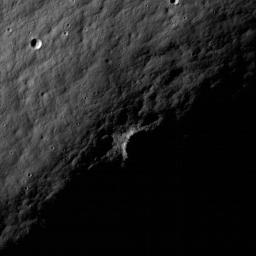
|
The Moon’s Largest Impact Basin
- Click the image above for a larger view
- Full-Res JPEG (1000 x 1000) (104.1 kB)
- Full-Res TIFF (1000 x 1000) (1.0 MB)
Caption:
A crater within a crater within a basin: the interior of the South Pole-Aitken basin is one of the most compelling destinations on the Moon. NAC image M103196768LE; scene width is 520 meters, or 1706 feet.
The South Pole-Aitken (SPA) basin is the largest and oldest recognized impact basin on the Moon. Its diameter is roughly 2,500 km or 1,550 miles. The Moon's circumference is just under 11,000 km, or 6835 miles, meaning the basin stretches across nearly a quarter of the Moon.
Background Info:
NASA's Goddard Space Flight Center built and manages the mission for the Exploration Systems Mission Directorate at NASA Headquarters in Washington. The Lunar Reconnaissance Orbiter Camera was designed to acquire data for landing site certification and to conduct polar illumination studies and global mapping. Operated by Arizona State University, LROC consists of a pair of narrow-angle cameras (NAC) and a single wide-angle camera (WAC). The mission is expected to return over 70 terabytes of image data.
Cataloging Keywords:
| Name | Value | Additional Values |
|---|---|---|
| Target | Moon | |
| System | Earth | |
| Target Type | Satellite | |
| Mission | Lunar Reconnaissance Orbiter (LRO) | |
| Instrument Host | Lunar Reconnaissance Orbiter | |
| Host Type | Orbiter | |
| Instrument | Lunar Reconnaissance Orbiter Camera (NAC) | |
| Detector | Narrow Angle Camera (NAC), Wide Angle Camera (WAC) | |
| Extra Keywords | Crater, Grayscale, Impact | |
| Acquisition Date | ||
| Release Date | 2010-07-13 | |
| Date in Caption | ||
| Image Credit | NASA/GSFC/Arizona State University | |
| Source | photojournal.jpl.nasa.gov/catalog/PIA13496 | |
| Identifier | PIA13496 | |
